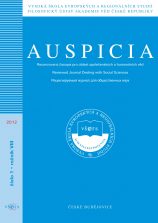„Homoloby“ ve „vatikánské gubernii“: agonistická demokracie v praxi? Politické dimenze současné diskuse o homosexualitě na Slovensku
“Homolobby” in the “Vatican Governorate”: Agonistic Democracy in Practice? Political Dimensions of Current Debate on Homosexuality in Slovakia
Author(s): Marián SekerákSubject(s): Politics, Gender Studies, Politics and society
Published by: Vysoká škola evropských a regionálních studií, z. ú.
Keywords: agonistic democracy; homosexuality; civil unions; political liberals; neoconservatives; conflict;
Summary/Abstract: The issue of civil unions of homosexuals has been one of the most discussed topics in the Slovak Republic during the last few years. In this paper I focus on the current public discourse over the issue. The analysis is framed within the theory of agonistic democracy as formulated by Chantal Mouffe. The results of the research of the discursive practices have proved that the debate on civil unions of homosexuals does not entirely fit the assumptions and expectations of the theory of agonistic democracy. Moreover, it seems obvious that in some cases the debate is even much closer to Carl Schmitt’s political theory of “decisionism”. The application of his theory has shown that the legitimacy is based: a) on the appeals to the amount of people or historical tradition (in case of the Slovak opponents of civil unions, i.e. neoconservatives), or b) on the full application of human and civil rights and state’s neutrality towards the individual conceptions of the good (as it was in case of the Slovak advocates of civil unions, i.e. political liberals). This kind of legitimacy, then, surpasses the legality which is represented by liberal-democratic institutions.
Journal: Auspicia
- Issue Year: 2015
- Issue No: 3-4
- Page Range: 22-54
- Page Count: 33
- Language: Czech

